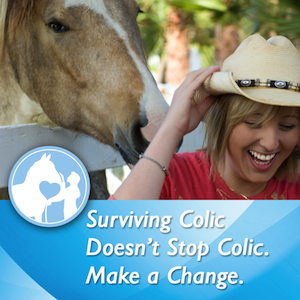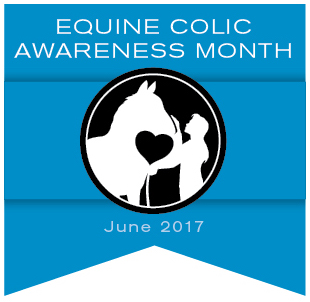 2013 Equine Colic Awareness Month Series Part 3 of 4
2013 Equine Colic Awareness Month Series Part 3 of 4
When your horse colics, knowing the common signs, calling the vet, and getting through even a minor colic is a temporary band-aid, not a permanent fix. Throughout the month of June, the second annual Equine Colic Awareness Month, we will be discussing the importance of colic prevention, why horses are prone to colic, how poor digestive health as a result of feeding and management may lead to colic, and what you can do to keep your horse’s gut healthy to reduce colic risk. Surviving colic doesn’t stop colic. Make a Change.
Colic in horses. Part of the reason it’s such a frightening diagnosis is that it’s such a vague problem. It has numerous presentations, there are many potential causes and they are often impossible to confirm definitively without surgery or autopsy.
There are many things that may cause a horse to colic. A few of the common known causes include:
- sand impaction
- enteroliths
- gastric rupture
- enteritis
- cancer
However, these only account for a very small percentage of confirmed diagnoses among all colic cases. Over 80% of the time, the colic is considered “idiopathic,” meaning “of unknown origin.” While your veterinarian may have a good idea of what caused the colic, such as gas build-up, impaction, and/or torsion, it’s difficult to prove. Thus, colic can also be difficult to treat and prevent.
On the other hand, many studies have related colic to specific management practices and overall poor digestive health. In fact, such practices, and the resulting GI health issues, could begin to explain many of these idiopathic colics. These practices include feeding grain as part of the diet, limiting turnout, and riding, traveling, and competing. Read more about the specific aspects of how we feed and manage horses today that can be detrimental to their gut health.
While we don’t know specifically why these practices contribute to colic risk, we do know that they do. Here’s a look at how the gut health in horses may be affected by how we care for them.
Poor Hindgut Health and Colic
One of the biggest problems for horses today is undigested starch from concentrated feeds reaching the hindgut. This is an issue because the hindgut is actually designed to support the fermentation of fiber found in forages. When good bacteria in the hindgut ferment sugars and starches instead, they produce lactic acid (among other things). This lowers the pH (ie, raises the acidity) of the hindgut. This, in turn, causes the beneficial microorganisms that aid in digestion to die off and release toxins called endotoxins.
This results in an environment that is, at best, imbalanced, and at worst, may lead to hindgut acidosis, colonic ulcers, laminitis, and potentially colic.
Colonic Ulcers and Colic
In addition to harming the bacterial balance of the hindgut, increased acidity may compromise the mucosal membrane that lines the hindgut wall. Lesions known as colonic ulcers may form. Endotoxins, released when microorganisms die, can then enter the horse’s bloodstream through these lesions.
In a 2002 study of 20 racehorses in Japan, researchers introduced endotoxins into the anterior mesenteric artery that provides blood to the small and large intestines. Many of the horses colicked. Thus, if endotoxins are introduced into the bloodstream through colonic ulcers, the horse may be at significant risk of colic.
When endotoxins enter the bloodstream, the body’s natural response to losing blood is for the vessels to constrict to stop the loss. In the case of colonic ulcers producing blood, this could results in decreased blood flow to the colon and the last few feet of the small intestine. This, in turn, may slow peristalsis (the surging action of GI tract muscles that moves food through). Also, lack of blood flow often leads to the death, or necrosis, of tissue at that location.. If a section of the intestines are necrotic, peristalsis is not possible there, and a blockage may ultimately occur. Both situations may then become causative factors in impaction colic.
Additionally, post-mortem analyses of horses’ GI tracts revealed that horses with colonic ulcers tend to have more flaccid colons, which may put them at risk for torsions.
If you think colonic ulcers couldn’t possibly affect your horse, think twice. Peer-reviewed research by Freedom Health found that 60% of performance horses suffer from colonic ulceration. Learn more about equine colonic ulcers, as well as signs your horse may be affected.
Changing Feeds Too Quickly May Lead to Colic
Any time there is a change in types of hard feed, pasture grass, or hay (including hay coming from different fields or suppliers) – the transition should be done gradually over a period of weeks.
Each horse has its own unique population of bacteria in the hindgut which is based on many factors, including the specific type of foods in its diet. Changing feed types too quickly can negatively impact the types of bacteria in the hindgut, causing them to die off and kicking off a chain of events that may result in colic.
So, What Now?
Clearly, the equine hindgut is highly sensitive and can easily be induced to colic for many reasons. But we can combat these episodes of induced colic by understanding the feeding and management factors that increase colic risk and implementing better care practices to improve our horses’ overall digestive health.
Tune in next week for the final installment of the Colic Awareness Month series as we discuss specific changes you can make and steps you can take to help prevent colic. Also check out Part 1: Intervention isn’t Prevention and Part 2: We May Be One Reason Horses Are Prone To Colic of this series.
Be sure to subscribe to the Crusade Blog and Join the Crusade email list so you don’t miss out on any of the important information and stories we will be sharing throughout the month of June. Also check out the various ways you can participate in Colic Awareness Month – including some opportunities to win great prizes for you and your horse.







tips regarding prevention of colic
More times than I can count on one hand I have been moved to tears on
this beautiful humble blog. If you want to hide the post dates from your Word – Press blog,
continue reading.